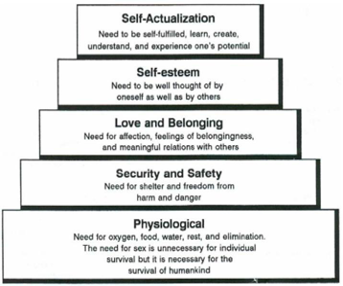2.2: Why are Goods sought?
- Page ID
- 77102
I am situated in the camp that the goodness of mankind is embedded in all that is important. Seeking the Goods refers to seeking the goodness in mankind, what are goods? Goods are at minimum is a tri-fold proposition, first those that are tangible, second those that provide forms of sensual pleasure, and third those that are intrinsically consumed. Why should this philosophy be important to members of the justice system in contemporary periods? Aristotle framed human behavior as aimed at some good (Albanese, 2010). He provided a hierarchy of goods, these are:
- Real goods (food, shelter, health, wealth, pleasure, knowledge, and liberty, friends, and civil peace.
- Apparent goods (items that ought to be desired regardless if we really do; Examples are sweets, good music, and fine wine).
- Ultimate good (happiness, that beyond usual definition).
These help establish a foundation for Moral Virtue. Aristotle defined this as excellence of character (Albanese, 2010). These initial ethical foundations did not survive in a vacuum as throughout history the goods that relate to virtue, that relate to character may be found in other works. One such prominent later work is by Abraham Maslow. His Hierarchy of Needs was published in 1943 that illustrates human motivation is similarly situated with the works of Aristotle (Maslow, 1943). Compare Aristotle’s 10 Moral Virtues in Figure 1. with Maslow’s Hierarchy of Needs Figure 2.
(Albanese, 2010, p. 17) |
Figure \(\PageIndex{1}\): Aristotle’s 10 Moral Virtues

Figure \(\PageIndex{2}\): Maslow’s Hierarchy of Needs
The original virtues, Courage, Temperance, Prudence, and Justice (Four Cardinal Virtues) located in Plato’s work and later Aristotle have been adopted by Theologians such as St. Thomas Aquinas in his "Summa Theologiae" of 1274 (McInerny, and O'Callaghan, 2016). Moral virtues have leached into modern political philosophy through the works of Thomas Hobbes and influences of John Locke in American politics and in the construct of the America’s Declaration of Independence and later the Social Contract Theory fused into the fabric of the “Rule of Law” in America today.
To summarize thus far those that commonly practice seeking goodness or real goods according to the moral virtues is morally virtuous. This has been referred to by Adler (1991) as the habit of right desire that is the “process of conquering one’s childish tendencies toward indulgence in immediate gratification” (p.106). The pathways provided by practice of moral virtues does not provide answers to ethical dilemmas but only a clearer method to form the correct decision.

